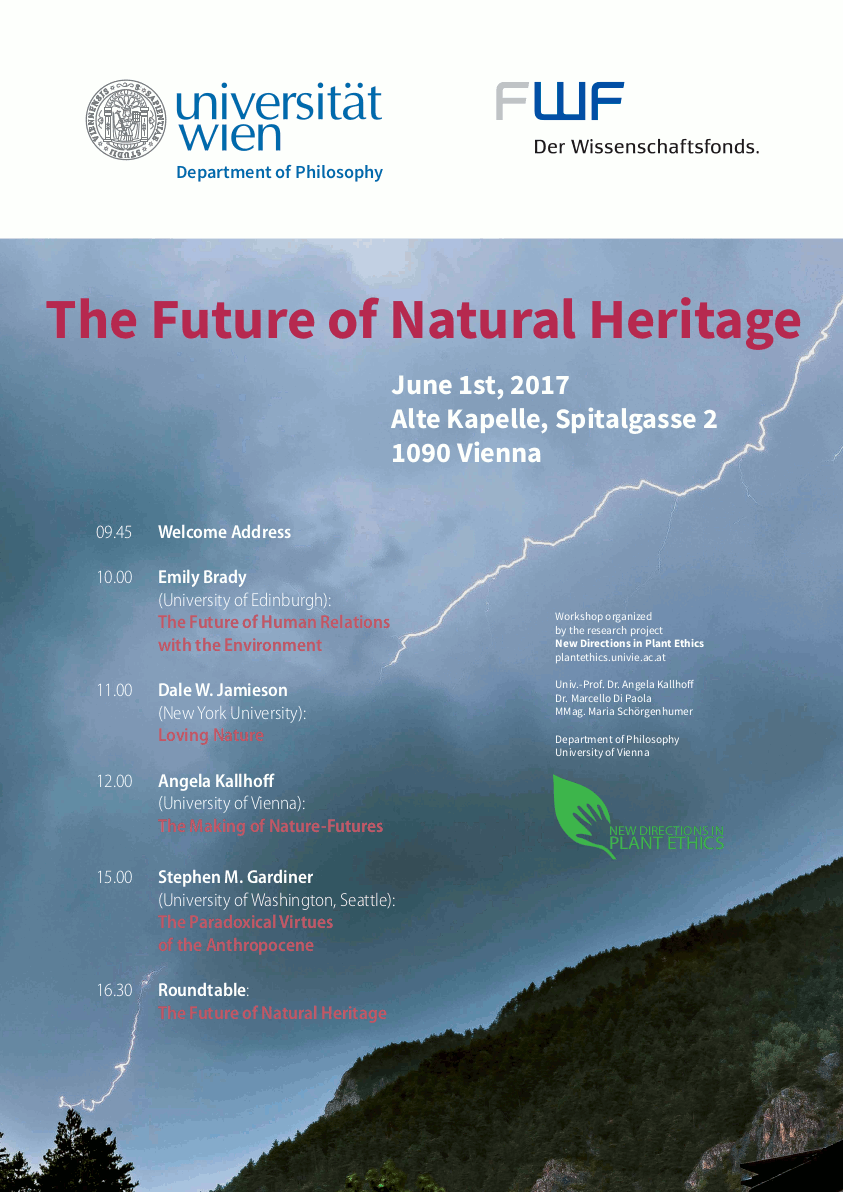Conference - June 1, 2017
The Future of Natural Heritage
9:45-17:00, Alte Kapelle/Altes AKH, Spitalgasse 2, 1090 Vienna
Humanity is remaking the planet through basic Earth systems disruption. Planetary ecological changes are accelerating under the pressure of a growing world population and a globalized, technologically enabled, highly interconnected, polluting, depleting and emitting form of life. These changes have cascading effects on natural entities, processes and systems. What is going to happen to the natural heritage that has come to us through millennia of relatively stable planetary conditions, which are now likely over? What is the future of our past? What values, meanings, and services of nature should we protect, and why? What moral and political principles should be guiding our attempts, and what forms of social organization are most likely to realize them? This conference explores various aspects of the enterprise of ensuring transfers of value and significance from the past and way into the future. It brings together distinguished environmental philosophers to discuss the unprecedentedly complex travails of the planet we made, and the next steps we could or should take. It focuses on philosophical analysis, but also aims at shaping concrete proposals for the future of natural heritage.
Programme:
09:45
Welcome Address
10:00
Emily Brady
The Future of Human Relations with the Environment
This paper argues that developing meaningful aesthetic-ethical relationships among and between species, and organic and inorganic entities, is central to shaping a shared future on earth. The contours of these relationships are outlined through three significant ‘ways of relating’, namely, aesthetics, humility, and wonder.
11:00
Dale W. Jamieson
Loving Nature
Aldo Leopold wrote that “we can only be ethical in relation to something we can see, understand, feel, love, or otherwise have faith in.” We cannot see or love the pre-industrial baseline of carbon in the atmosphere. Nor can we love biodiversity. Some doubt that we can love nature at all. In this talk I provide an account of love and show how it is possible for us to love nature.
12:00
Angela Kallhoff
The Making of Nature-Futures
This talk starts with an assessment of the loss-of-agency thesis. Authors who support the Anthropocene diagnosis usually also support the loss of agency. The first section explores three meanings of this thesis. I shall then argue that this thesis is false. In exploring recent developments in plant ethics, I shall argue that even though agency-models have changed, key areas of plant technologies and plant cultivation rest on decisions. The examples that will be discussed include smart farming and the transformation of landscapes. Overall, both the values at stake in caring for natural heritage, as also the decision procedures have changed. Yet, the "making of future-natures" is a project of agency.
15:00
Stephen M. Gardiner
The Paradoxical Virtues of the Anthropocene
Some believe that the onset of the Anthropocene - a new geological era marked by the dominance of humanity on the history of the planet - forces us to look anew at human virtues. In this paper, I discuss how to think about whether the evolving influence of humanity on the Earth's environment really does call for new virtues, and how such virtues may be seen as contributing to human flourishing. I defend two controversial claims: (a) that genuinely new virtues may be involved; and (b) that these may be virtues to which we should not (yet?) aspire.
16:00
Roundtable
The Future of Natural Heritage

